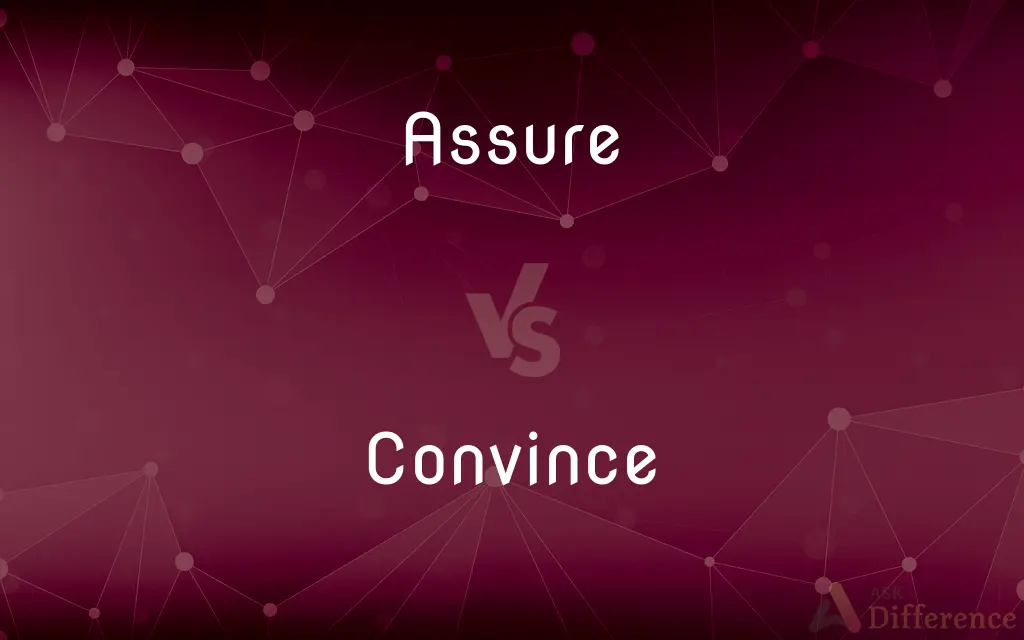Assure vs. Convince — What's the Difference?
By Fiza Rafique & Maham Liaqat — Updated on March 29, 2024
Assure involves giving confidence or a promise of certainty, while convince requires persuading someone to believe or accept something.

Difference Between Assure and Convince
Table of Contents
ADVERTISEMENT
Key Differences
Assure and convince play pivotal roles in communication, highlighting the nuances of influencing thoughts and feelings. To assure someone is to instill confidence or guarantee certainty about an event or condition, often used to alleviate doubts or fears. For instance, a parent might assure their child of safety during a storm. On the other hand, to convince someone involves persuading them to believe or accept a proposition or viewpoint through reasoning or evidence. This process requires changing the listener's mind or opinion, as in convincing a friend to adopt a healthier lifestyle.
While assurance is grounded in providing comfort or security, convincing is anchored in the realm of belief and acceptance. Assuring someone typically involves affirming the reliability or truth of something with confidence. This can be seen in scenarios where assurance is given to reinforce trust or security without necessarily requiring evidence. Conversely, convincing someone often demands logical argumentation, evidence, or demonstration, focusing on the intellect rather than emotional support. The act of convincing aims at mental agreement or consent.
The emotional contexts in which assure and convince are used also differ significantly. Assuring someone is inherently a supportive and often emotional act, aimed at reducing anxiety or worry. It is a gesture of solidarity and comfort, reflecting a desire to ease another's concerns. On the contrary, convincing someone can be a more intellectual endeavor, engaging the person's reasoning capabilities and skepticism. It is not merely about providing comfort but about leading someone to a new understanding or perspective.
Moreover, the outcomes of assuring versus convincing can have different implications. When you assure someone, the primary outcome is increased confidence or peace of mind regarding a specific matter. However, when you convince someone, the result is a changed belief or attitude, which might lead to a change in behavior or decision-making. This distinction underscores the different purposes and effects these actions can have, depending on the context and intent behind the communication.
In summary, assure and convince cater to different aspects of human interaction and influence. Assuring is about offering comfort and security, often without the need for proof, whereas convincing is about changing a person’s beliefs or opinions through argumentation and evidence. Both are essential in communication but serve distinct purposes and elicit different responses in the receiver.
ADVERTISEMENT
Comparison Chart
Definition
To give confidence or promise certainty.
To persuade someone to believe or accept something.
Primary Focus
Emotional support and comfort.
Intellectual agreement and acceptance.
Method
Providing guarantees or confidence.
Using logic, evidence, or argumentation.
Emotional Context
Often used to alleviate worry or doubt.
Aimed at changing beliefs or opinions.
Outcome
Increased confidence or peace of mind.
Change in belief, attitude, or behavior.
Compare with Definitions
Assure
To promise or guarantee certainty.
The pilot assured passengers of a smooth flight.
Convince
Persuading someone to accept a point of view.
He convinced his colleagues to adopt the new strategy.
Assure
To confirm something positively.
The manager assured the team that the project was on track.
Convince
Involving evidence or reasoning.
The lawyer convinced the jury with compelling evidence.
Assure
Offering comfort or support.
She assured her friend of her unwavering support during difficult times.
Convince
Resulting in decision or behavior change.
The presentation convinced the company to invest in renewable energy.
Assure
Relating to emotional security.
The doctor assured the patient's family about the success of the procedure.
Convince
Engaging intellect and skepticism.
The article convinced readers of the need for climate action.
Assure
Removing doubts or fears.
He assured his parents that he was well-prepared for the exam.
Convince
Leading to a change in belief.
She convinced her brother about the importance of recycling.
Assure
To inform positively, as to remove doubt
Assured us that the train would be on time.
Convince
To cause (someone) by the use of argument or evidence to believe something or to take a course of action.
Assure
To cause to feel sure
A gesture that assured her of his devotion.
Convince
To prove to be wrong or guilty.
Assure
To give confidence to; reassure.
Convince
To conquer; overpower.
Assure
To make certain; ensure
"Nothing in history assures the success of our civilization" (Herbert J. Muller).
Convince
To make someone believe, or feel sure about something, especially by using logic, argument or evidence.
I wouldn't have or do something, unless I'm convinced that it's good.
Assure
To make safe or secure
"We would rather forgo certain benefits in order to be assured against certain evils" (Alfred E. Smith).
Convince
To persuade.
Assure
Chiefly British To insure, as against loss.
Convince
To overcome, conquer, vanquish.
Assure
(transitive) To make sure and secure; ensure.
Convince
To confute; to prove wrong.
Assure
To give (someone) confidence in the trustworthiness of (something).
I assure you that the program will work smoothly when we demonstrate it to the client.
He assured of his commitment to her happiness.
Convince
To prove guilty; to convict.
Assure
(obsolete) To guarantee, promise (to do something).
Convince
To overpower; to overcome; to subdue or master.
His two chamberlainsWill I with wine and wassail so convinceThat memory, the warder of the brain,Shall be a fume.
Assure
(transitive) To reassure.
Convince
To overcome by argument; to force to yield assent to truth; to satisfy by proof.
Such convincing proofs and assurances of it as might enable them to convince others.
Assure
To make sure or certain; to render confident by a promise, declaration, or other evidence.
His promise that thy seed shall bruise our foe . . . Assures me that the bitterness of deathIs past, and we shall live.
Convince
To confute; to prove the fallacy of.
God never wrought miracle to convince atheism, because his ordinary works convince it.
Assure
To declare to, solemnly; to assert to (any one) with the design of inspiring belief or confidence.
I dare assure thee that no enemyShall ever take alive the noble Brutus.
Convince
To prove guilty; to convict.
Which of you convinceth me of sin?
Seek not to convince me of a crimeWhich I can ne'er repent, nor you can pardon.
Assure
To confirm; to make certain or secure.
And it shall be assured to him.
And hereby we know that we are of the truth, and shall assure our hearts before him.
Convince
Make (someone) agree, understand, or realize the truth or validity of something;
He had finally convinced several customers of the advantages of his product
Assure
To affiance; to betroth.
Assure
To insure; to covenant to indemnify for loss, or to pay a specified sum at death. See Insure.
Assure
Make certain of;
This nest egg will ensure a nice retirement for us
Preparation will guarantee success!
Assure
Inform positively and with certainty and confidence;
I tell you that man is a crook!
Assure
Assure somebody of the truth of something with the intention of giving the listener confidence;
I assured him that traveling to Cambodia was safe
Assure
Be careful or certain to do something; make certain of something;
He verified that the valves were closed
See that the curtains are closed
Control the quality of the product
Assure
Cause to feel sure; give reassurance to;
The airline tried to reassure the customers that the planes were safe
Assure
Make a promise or commitment
Common Curiosities
Is convincing always a rational process?
Convincing is largely a rational process that involves engaging someone's intellect and reasoning, though emotional appeals can also play a role.
Can you assure someone without being certain?
Assuring typically implies a high degree of confidence, but it can sometimes be offered as a form of support even if absolute certainty is lacking.
What's the difference between convincing someone and persuading them?
Convincing someone focuses on changing their mind or belief through logic and evidence, while persuading might also involve emotional appeals to encourage a specific action or decision.
Is it easier to assure or convince someone?
The ease of assuring versus convincing someone depends on the context, the individual's mindset, and the nature of the relationship between the parties involved.
Can assurance also involve providing evidence?
While assurance can be based on factual information, it primarily focuses on giving confidence or comfort, not necessarily through evidence.
How do assurance and convincing affect relationships?
Assurance can strengthen relationships by building trust and providing comfort, while convincing can enhance understanding and respect for differing viewpoints.
What does it mean to assure someone?
To assure someone means to give them confidence or guarantee certainty about something, often to alleviate doubts or fears.
How do you convince someone of something?
Convincing someone involves persuading them through logic, evidence, or argumentation to accept or believe a particular viewpoint or idea.
Can you both assure and convince someone at the same time?
Yes, in some contexts, you can both assure and convince someone, providing both emotional support and logical reasons for a particular stance or action.
Why is it important to know the difference between assuring and convincing?
Understanding the difference helps tailor communication effectively, ensuring the intended message is conveyed and received as desired, whether it’s to provide comfort or change a belief.
Share Your Discovery

Previous Comparison
Evaluatee vs. Evaluand
Next Comparison
Doughnut vs. BismarckAuthor Spotlight
Written by
Fiza RafiqueFiza Rafique is a skilled content writer at AskDifference.com, where she meticulously refines and enhances written pieces. Drawing from her vast editorial expertise, Fiza ensures clarity, accuracy, and precision in every article. Passionate about language, she continually seeks to elevate the quality of content for readers worldwide.
Co-written by
Maham Liaqat














































